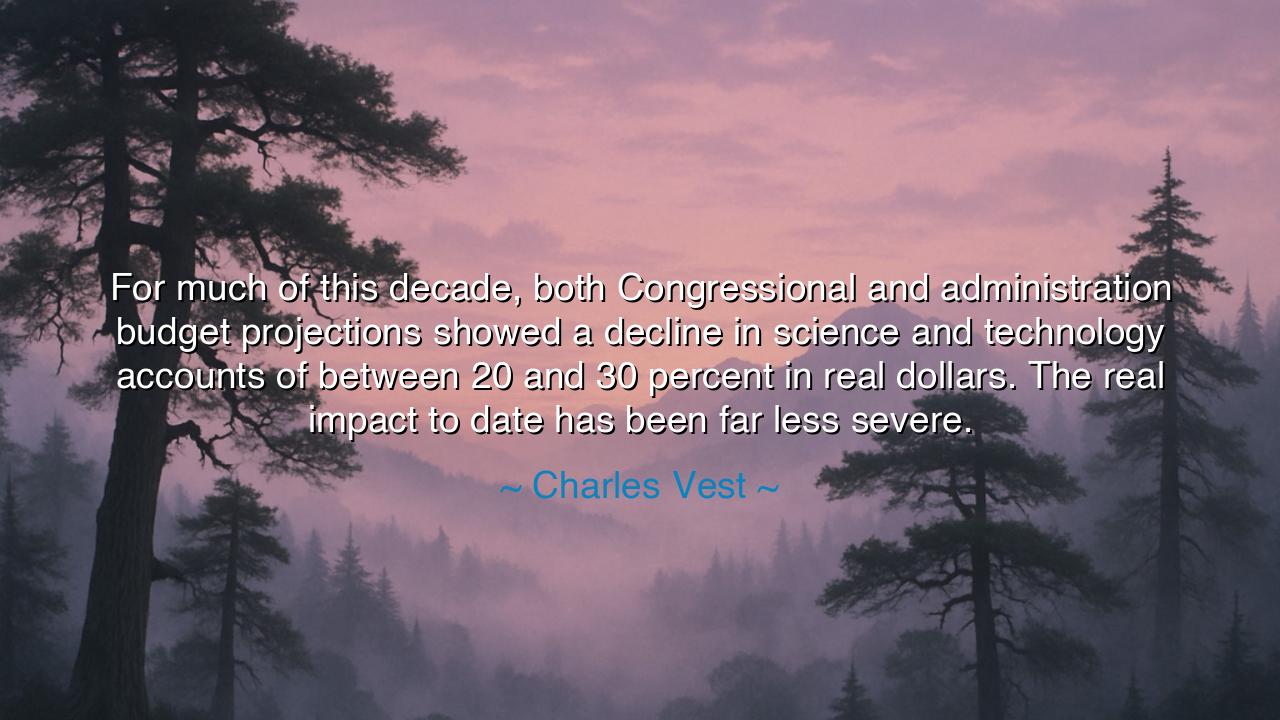
For much of this decade, both Congressional and administration
For much of this decade, both Congressional and administration budget projections showed a decline in science and technology accounts of between 20 and 30 percent in real dollars. The real impact to date has been far less severe.






The words of Charles Vest, “For much of this decade, both Congressional and administration budget projections showed a decline in science and technology accounts of between 20 and 30 percent in real dollars. The real impact to date has been far less severe,” reveal the tension between fear and reality, between numbers on paper and the enduring strength of the human spirit. In his statement, Vest—who was the president of the Massachusetts Institute of Technology—acknowledged the looming shadow of cuts to science and technology funding, yet he also testified that the true damage had not yet struck with the severity foretold. It is a reminder that while resources may dwindle, resilience and ingenuity often rise to temper the blow.
The origin of these words lies in the struggles of the 1990s, when debates over federal budgets threatened the lifeblood of research and innovation in America. Projections warned of steep declines—20 to 30 percent reductions that could cripple laboratories, silence projects, and weaken the nation’s leadership in science. Yet Vest, though cautious, observed that the actual effects had been lighter than feared. His words stand as both a relief and a caution: relief that disaster had not yet arrived, and caution that continued neglect could still erode the foundations of progress.
History has shown this pattern time and again. In the age of the Apollo Program, vast resources were poured into space exploration, and mankind touched the moon. Yet when political winds shifted and budgets tightened, many feared the dream of space would collapse. Though programs were cut, innovation endured—private companies, smaller projects, and the determination of scientists kept the torch alive. Vest’s observation reflects this ancient rhythm: that projections may show decline, yet the real impact often depends upon the resilience of the people and the institutions that carry the work forward.
The story of Florence Nightingale during the Crimean War offers another parallel. When medical supplies were projected to run short, when resources seemed insufficient, many predicted catastrophe. Yet through efficiency, innovation, and sheer determination, she and her nurses minimized the suffering far more than the numbers suggested was possible. In both her case and Vest’s, we learn that forecasts of decline are not destiny—they are warnings that can be overcome by human will, cleverness, and adaptability.
The deeper meaning of Vest’s words is that the strength of science and technology does not rest solely in the currency of budgets, but also in the unwavering commitment of those who labor in the pursuit of knowledge. Money may build laboratories, but it is passion that keeps experiments alive. Projections may forecast doom, but innovation often finds ways to stretch resources, to do more with less, and to preserve progress even in lean times. The numbers matter, yes, but they do not tell the whole story.
Yet let us not grow complacent. Vest’s relief that the impact had been less severe should not blind us to the danger of neglect. Great civilizations that once led the world in knowledge have fallen into stagnation because they failed to sustain their commitment to learning. Ancient Egypt, once the beacon of engineering, declined when its rulers turned inward. The Abbasid Caliphate, which nurtured a golden age of mathematics and astronomy, dimmed when political strife diverted resources away from scholarship. The lesson is clear: temporary resilience must not excuse long-term neglect.
For us who hear these words, the call is simple and urgent. Defend and support the institutions of science and technology, for they are the engines of both prosperity and security. Do not be deceived by the momentary endurance of the system—rather, take it as proof of what might be accomplished if support were strengthened rather than diminished. In your own life, do not withhold resources from your children’s learning, from your own growth, or from the advancement of wisdom. For what is true of nations is true also of families: if you starve learning today, you weaken tomorrow.
Thus, the teaching of Charles Vest becomes clear: forecasts of decline may not always strike with their full weight, but they are warnings nonetheless. Celebrate the resilience of the present, but prepare for the future with vigilance. Strengthen science, nurture technology, and protect the pursuit of knowledge, for in them lies the enduring power of a people to weather hardship, surpass projections, and continue the eternal march of progress.






AAdministratorAdministrator
Welcome, honored guests. Please leave a comment, we will respond soon